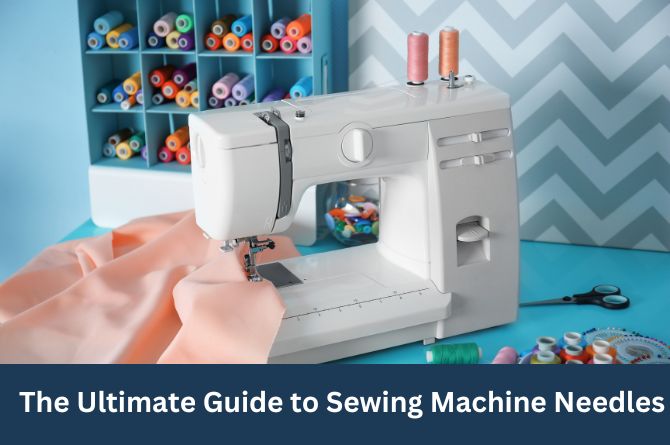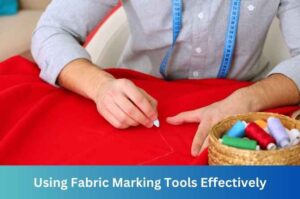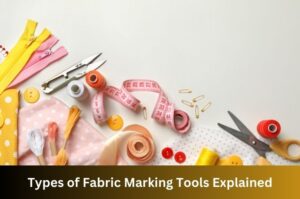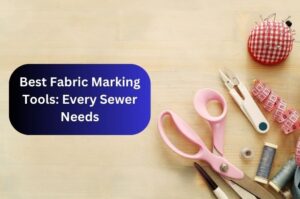Sewing enthusiasts, whether beginners or experts, often find themselves asking, “Are sewing machine needles universal?” This question stems from the need for clarity when navigating the world of sewing machines, fabrics, and various projects. Sewing machine needles may seem like a small part of the process, but they play a critical role in the success of your sewing projects.
In this article, we’ll explore the idea of whether sewing machine needles are universal, the types of needles available, and how to choose the best one for your project. By the end, you’ll have a better understanding of the different needle types and when to use each.
Topics Analyzed
Are Sewing Machine Needles Truly Universal?
To answer the question, we need to clarify what “universal” means. In general terms, a universal product can be used across multiple machines or settings. So, when people ask if sewing machine needles are universal, they are often wondering if a single needle type can be used on any sewing machine, regardless of brand or model.
The short answer is no, sewing machine needles are not entirely universal. While there are some needle types designed to fit a variety of machines, many factors, such as machine type, project requirements, and fabric, will determine the specific needle you need.
Understanding Sewing Machine Needles
Sewing machine needles come in a variety of shapes and sizes, each specifically designed for different types of fabric, thread, and stitching tasks. The needle’s anatomy consists of several parts:
- Shank: The upper part of the needle that fits into the machine.
- Shaft: The long part of the needle where the eye and the point are located.
- Eye: The hole where the thread passes through.
- Point: The tip of the needle that penetrates the fabric.
The shank is critical because it determines compatibility with different sewing machines. While domestic sewing machines generally use needles with a flat shank on one side, industrial machines may require needles with a completely round shank. Therefore, the answer to whether sewing machine needles are universal can depend on the machine you are using.
Types of Sewing Machine Needles
Understanding the different types of sewing machine needles is essential in making the right choice for your project. Here are the most common types:
- Universal Needles: As mentioned, these are versatile needles with a medium-point tip. They work well with light- to medium-weight fabrics and are ideal for beginners.
- Ballpoint Needles: These have a rounded tip that allows them to slip between the fibers of knit fabrics rather than piercing them. This reduces the risk of fabric damage, making them perfect for jersey and other stretch fabrics.
- Quilting Needles: These needles are designed with a tapered point to handle the layers of fabric and batting that are common in quilting. They help prevent skipped stitches and fabric bunching.
- Jeans/Denim Needles: These have a sharp point and a strong shaft to penetrate heavy fabrics like denim, canvas, or other tightly woven fabrics.
- Leather Needles: These needles have a cutting point specifically designed to sew through leather and other tough materials without tearing them.
- Embroidery Needles: These needles have a larger eye and a special scarf to handle decorative threads without fraying or breaking.
- Twin Needles: Twin needles are unique in that they have two needles attached to one shank. They are used for creating parallel rows of stitching, which is often seen in hemming or decorative work.
Needle Sizes and How They Affect Sewing
Beyond the type of needle, the size is another critical factor in choosing the correct sewing machine needle. Needle sizes are indicated by two numbers, such as 80/12 or 90/14. The first number refers to the European sizing system, while the second is the American system.
The size of the needle you need depends on the weight of your fabric. Larger numbers indicate thicker needles, which are better suited for heavier fabrics. For example:
- 60/8: Fine needle for lightweight fabrics like silk or chiffon.
- 80/12: Standard size for medium-weight fabrics like cotton.
- 90/14: Thicker needle for heavier fabrics like denim.
- 100/16 and above: Reserved for very thick fabrics such as leather or upholstery.
How to Choose the Right Needle for Your Project
Choosing the right sewing machine needle depends on two main factors: the fabric you are using and the type of stitch you are planning. Here are a few tips to guide your selection:
- For woven fabrics like cotton or linen, a universal needle will often suffice.
- For knits and stretchy fabrics, opt for a ballpoint needle to avoid snags and holes.
- When working with denim, canvas, or heavy fabrics, a jeans needle is your best bet.
- For delicate fabrics, such as silk or chiffon, a finer needle like a size 60/8 will help prevent damage.
Are Sewing Machine Needles Interchangeable Between Machines?
Many domestic sewing machines use the same type of needle shank, which makes it seem like sewing machine needles are universal in some ways. Most household sewing machines require flat-shank needles, which are the standard for brands like Singer, Brother, Janome, and others. Therefore, a universal needle designed for domestic machines will likely fit any standard home machine.
However, if you’re working with an industrial sewing machine, the story changes. Industrial machines often require specific needles that are designed for higher speeds, thicker materials, and more demanding work. These needles might have round shanks and are typically not interchangeable with domestic machine needles.
Even within domestic machines, there are some exceptions. Specialty machines, such as sergers or embroidery machines, may require specific needle types or sizes that aren’t compatible with a standard sewing machine needle.
Signs You’re Using the Wrong Needle
Using the wrong needle can quickly lead to problems in your project. Here are a few signs that it might be time to change your needle:
- Skipped Stitches: If your stitches are uneven or the machine is skipping stitches altogether, your needle might be too dull or the wrong size for the fabric.
- Fabric Damage: Holes, pulls, or snags in your fabric are indicators that your needle is not suited for the material.
- Breaking Thread: If your thread keeps breaking, it could be due to a needle that is too small or sharp for the thread type.
- Unusual Noises: If your sewing machine makes strange sounds when sewing, it could be struggling with an incompatible needle.
The Importance of Regularly Changing Needles
Sewing machine needles wear out faster than you might think. Even the highest-quality needles will become dull after prolonged use. Experts recommend changing your needle after every 8-10 hours of sewing or at the start of each new project.
Regularly changing your needle ensures that your stitches remain even and that your machine runs smoothly. It’s also a good practice to keep a variety of needle types and sizes on hand, so you’re always prepared for different projects.
Specialty Needles for Unique Projects
In addition to the standard needle types, there are specialty needles designed for specific tasks. Some examples include:
- Twin Needles: These are two needles attached to a single shank, used for creating parallel rows of stitches.
- Wing Needles: These have wide, flat wings on either side of the shaft, which create holes in the fabric for heirloom sewing techniques like hemstitching.
- Topstitch Needles: These have a larger eye to accommodate thicker threads used in topstitching and decorative stitching.
Using the right specialty needle can make a significant difference in the quality and appearance of your finished project.
Final Thoughts
So, are sewing machine needles universal? While there is a needle called the “universal needle,” it doesn’t mean that all sewing machine needles can be used universally across different machines and projects.
The reality is that choosing the right needle depends on several factors, including your fabric, your sewing machine, and the type of stitching you want to achieve.
By understanding the different types of sewing machine needles and how to select the correct one for your project, you’ll be well on your way to sewing success. Remember to regularly change your needles, and always refer to your sewing machine’s manual for guidance on compatibility.
Sewing is both an art and a science, and selecting the right tools—like your needle—can make all the difference in the outcome of your work.




